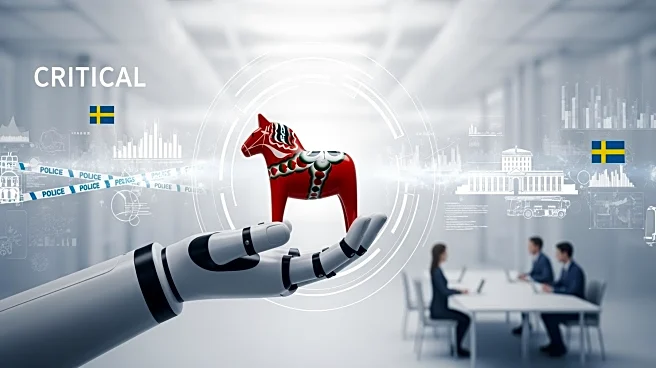What's Happening?
Recent analyses have explored the impact of AI on employment across various sectors and countries, with a focus on the U.S., UK, and Western Europe. Despite concerns about AI-driven job displacement, data
from labor force surveys indicate no clear relationship between AI exposure and employment trends. However, specific sectors, such as online gig work and junior coding jobs, have shown signs of disruption. In Sweden, a survey by Unionen, the largest white-collar trade union, revealed that AI has been rapidly adopted, with two-thirds of respondents indicating its implementation in their companies. Despite this, 80% reported no impact on staffing levels, while 10% noted an increase and another 10% a decrease. The survey suggests that future AI implementations may focus more on efficiency, potentially affecting employment.
Why It's Important?
The findings highlight the nuanced impact of AI on employment, suggesting that while AI adoption is widespread, its effect on job displacement is limited to specific roles and sectors. This has implications for policymakers and businesses as they navigate the integration of AI technologies. The potential for AI to drive efficiencies in the next phase of adoption could lead to more significant employment changes, particularly in sectors heavily reliant on routine tasks. Understanding these dynamics is crucial for developing strategies that mitigate negative impacts on workers while leveraging AI's benefits for productivity and innovation.
What's Next?
As AI continues to be integrated into business operations, companies may shift focus from experimentation to efficiency, potentially leading to more pronounced effects on employment. Stakeholders, including unions and policymakers, will need to monitor these developments closely to address any emerging challenges. The impact of AI on outsourcing and its role in displacing tasks rather than jobs will be areas of interest for future analysis. Companies may need to balance AI adoption with workforce development to ensure sustainable growth and minimize disruption.
Beyond the Headlines
The survey results from Sweden underscore the importance of considering international perspectives on AI's impact. While the U.S. has been a focal point, other tech-friendly economies like Sweden provide valuable insights into AI adoption and its effects. The role of unions in Sweden, with their extensive reach and access to company boards, offers a unique vantage point for understanding labor market changes. This highlights the need for cross-country comparisons to fully grasp AI's global implications.








